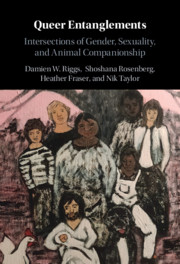Book contents
- Queer Entanglements
- Queer Entanglements
- Copyright page
- Contents
- Figures
- Acknowledgements
- Frontispiece
- 1 Menageries, Enmeshment, and Irreducibility
- 2 Love, Loss, and Grief
- 3 Violence, Cruelty, and Rescue
- 4 Sameness, Difference, and Intercorporeality
- 5 Rainbows, Flags, and Bridges
- 6 Consumption, Consumerism, and Kink
- 7 Voice, Responsibility, and Liberation
- References
- Index
2 - Love, Loss, and Grief
Published online by Cambridge University Press: 09 July 2021
- Queer Entanglements
- Queer Entanglements
- Copyright page
- Contents
- Figures
- Acknowledgements
- Frontispiece
- 1 Menageries, Enmeshment, and Irreducibility
- 2 Love, Loss, and Grief
- 3 Violence, Cruelty, and Rescue
- 4 Sameness, Difference, and Intercorporeality
- 5 Rainbows, Flags, and Bridges
- 6 Consumption, Consumerism, and Kink
- 7 Voice, Responsibility, and Liberation
- References
- Index
Summary
In this chapter, we examine how women of diverse genders and sexualities speak about their relationships with animal companions. Drawing on an interview study, this chapter argues that for many women, loving relationships with animals highlight the tension between enmeshment and irreducibility. On the one hand, the women interviewed spoke about the genuine love and affection they experience with animal companions. This love was ‘more-than-human’, even if at the same time accounts of love were often framed in human terms. On the other hand, when speaking about the loss of an animal companion, the women interviewed acknowledged that the irreducibility of human and animal lives to one another meant that their grief was often not acknowledged. This chapter asks the question, then, of what it means to love an animal, knowing that humans are likely to outlive most domesticated animals and that the death of an animal is rarely seen as significant by other humans. How women of diverse genders and sexualities make sense of this question, this chapter argues, speaks to how being situated at the margins of intelligibility in terms of gender or sexuality affords women the space to think about the intelligibility or grievability of love for animal companions.
- Type
- Chapter
- Information
- Queer EntanglementsIntersections of Gender, Sexuality, and Animal Companionship, pp. 32 - 63Publisher: Cambridge University PressPrint publication year: 2021

